Culture_tips(十天突破英语口语(1)
- 格式:docx
- 大小:12.53 KB
- 文档页数:1
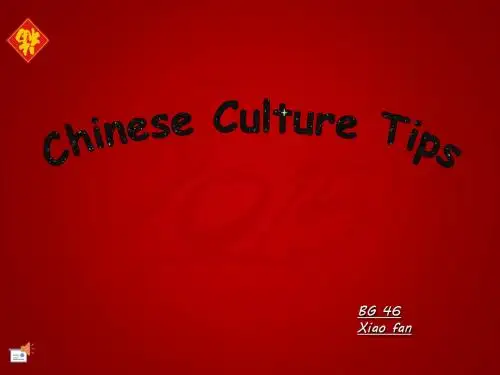
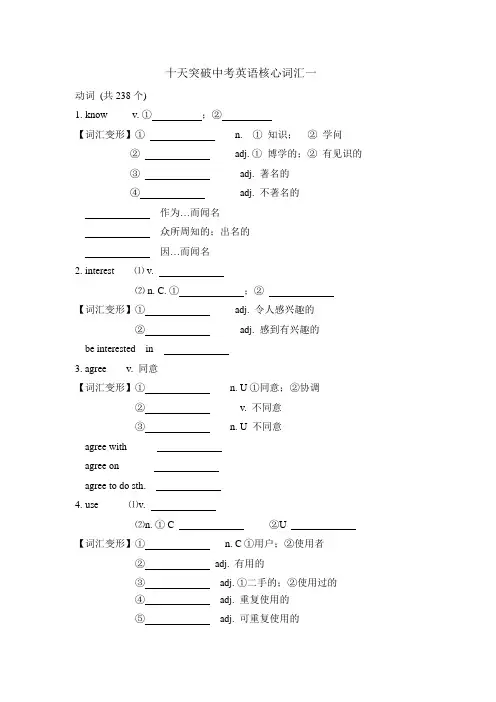
十天突破中考英语核心词汇一动词(共238个)1.know v. ①;②【词汇变形】①n. ①知识;②学问②adj. ①博学的;②有见识的③adj. 著名的④adj. 不著名的作为…而闻名众所周知的;出名的因…而闻名2. interest ⑴ v.⑵ n. C. ①;②【词汇变形】①adj. 令人感兴趣的②adj. 感到有兴趣的be interested in3. agree v. 同意【词汇变形】①n. U ①同意;②协调②v. 不同意③n. U 不同意agree withagree onagree to do sth.e ⑴v.⑵n. ① C ②U【词汇变形】①n. C ①用户;②使用者②adj. 有用的③adj. ①二手的;②使用过的④adj. 重复使用的⑤adj. 可重复使用的⑥adj. 无用的使用,利用习惯做某事过去常做某事5.change ⑴v. (2) n. C【词汇变形】①adj. 变化的②adj. 善变的,易变的③⑴v. 交换⑵n. U交换6.decide v. 决定【词汇变形】①n. C 决定7.do v. ①(实义动词)做,②助动词(无实义)8.include v.包括【词汇变形】①adj. 被包含的②prep. 包括9. complete ⑴ v. ⑵ adj. ①【词汇变形】adv. ①彻底地,②完全地10 .develop v. ,【词汇变形】①n. U 发展②adj. 发展中的③adj. 发达的④adj. 不够发达的11.fail v. ①;②;③【词汇变形】①f n. C 失败失败;未做成12.write v.写【词汇变形】①n. ① C作品;②U 书写②n. C 作家③adj. 书面的13.act ⑴ v. ①②【词汇变形】①n. C ①男演员;②演员②n. C女演员③n. C 活动④n. C行动⑤adj. ①积极的;②活跃的⑥adv. 积极地14.stop ⑴v. ①;②⑵n. C ①;②停下来去做…停止做阻止…做…15.take v. ①;②;③;④;⑤;⑥过去式过去分词参加,参与呈现;占据(时间,地方);开始从事起飞;脱下;离开取出;去掉;考虑到;说服重视;认真对待…带走,拿走,取走接管;接收认为…理所当然接管,负责好好照顾;珍重16. tell v. ①;②;③17. die v. ①;②【词汇变形】①n. U 死亡②adj.死的adj.致命的adj.垂死的因……死,死于(疾病,内因)死于;因…而死(车祸,意外,外因)灭绝;消失逐渐消失18. disappoint v.【词汇变形】①n. U 失望adj. 令人失望的adj. 感到失望的19. influence ⑴ v.⑵ n. ②C20. learn v. ①;②【词汇变形】①n. C 学习者向……学习21. like ⑴ v.⑵ prep.⑶ n. C【词汇变形】→dislike ⑴ v.⑵ n.→unlike prep.22. make v. ①;②;③【词汇变形】①n. C 生产者确信;证实弥补;组成;化妆;充分利用与…交友有影响,有关系作决定使它变成可能谋生,维持生活犯错误贡献make it ;;23.need ⑴ v. 需要⑵ n. U 需要...= 需要被做24. push v. ①;②;③25. repeat v. 重复【词汇变形】①n n. C 重复26. rest ⑴ v.⑵ n. C ①;②其余的;剩下的27. sell v. 卖【词汇变形】①n. U ①销售;②出售n. C 卖方n. U ①特价销售;②出售28. show ⑴ v. ①;②⑵ n. C ①;②;③【词汇变形】①⑴ n. C ①淋浴器;②阵雨⑵ v. ①淋浴;②下阵雨展览着,在公开展出露面;露出;揭露炫耀;卖弄带领……参观29. sit v. ①【词汇变形】①seat n. Cv.30. spend v. ①;②过去式过去分词在…方面花费花费时间做某事和......呆在一起31. understand v. 理解【词汇变形】①understanding ⑴ adj.⑵ n. C→ v. 误解①n. C 误解过去式过去分词32. win v. ①;②【词汇变形】①n. C 获胜者过去式过去分词33. wonder ⑴ v.⑵ n. C【词汇变形】①adj. 精彩的→adv. 精彩地34. argue v. 争吵【词汇变形】①n. C 争论争论;和…争吵争论;议论某事35. begin v.【词汇变形】①n. C 开头n. C 初学者36. cheer v.【词汇变形】①cheerful adj.使.......高兴为……欢呼。
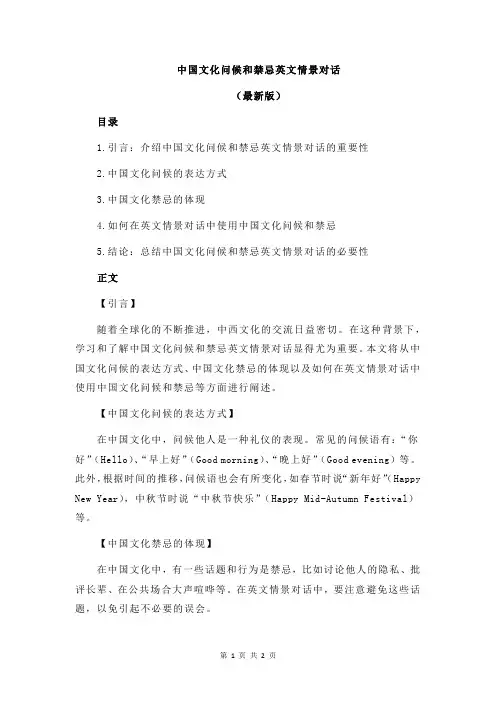
中国文化问候和禁忌英文情景对话(最新版)目录1.引言:介绍中国文化问候和禁忌英文情景对话的重要性2.中国文化问候的表达方式3.中国文化禁忌的体现4.如何在英文情景对话中使用中国文化问候和禁忌5.结论:总结中国文化问候和禁忌英文情景对话的必要性正文【引言】随着全球化的不断推进,中西文化的交流日益密切。
在这种背景下,学习和了解中国文化问候和禁忌英文情景对话显得尤为重要。
本文将从中国文化问候的表达方式、中国文化禁忌的体现以及如何在英文情景对话中使用中国文化问候和禁忌等方面进行阐述。
【中国文化问候的表达方式】在中国文化中,问候他人是一种礼仪的表现。
常见的问候语有:“你好”(Hello)、“早上好”(Good morning)、“晚上好”(Good evening)等。
此外,根据时间的推移,问候语也会有所变化,如春节时说“新年好”(Happy New Year),中秋节时说“中秋节快乐”(Happy Mid-Autumn Festival)等。
【中国文化禁忌的体现】在中国文化中,有一些话题和行为是禁忌,比如讨论他人的隐私、批评长辈、在公共场合大声喧哗等。
在英文情景对话中,要注意避免这些话题,以免引起不必要的误会。
【如何在英文情景对话中使用中国文化问候和禁忌】在英文情景对话中,要恰当地使用中国文化问候,例如:A: Hello, how are you?B: Fine, thank you.And you?A: I"m doing well, thank you.同时,要注意避免谈论中国文化禁忌的话题,如:A: Do you know that Jack"s parents are divorced?B: Oh, I didn"t know.It"s kind of private.【结论】总之,了解中国文化问候和禁忌英文情景对话对于提高跨文化交际能力具有重要意义。
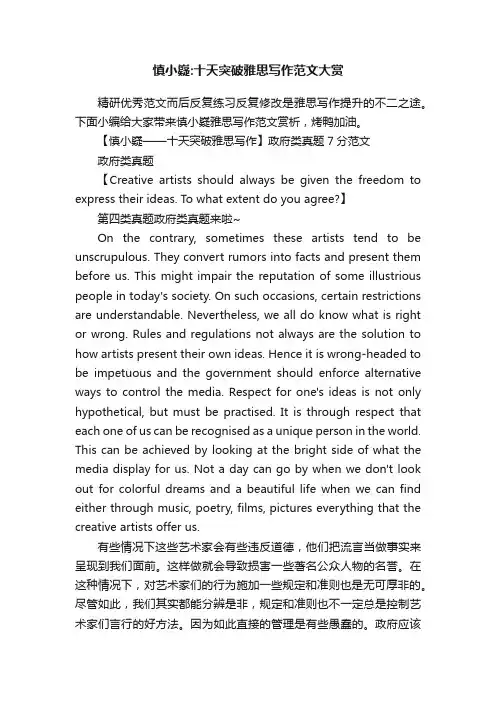
慎小嶷:十天突破雅思写作范文大赏精研优秀范文而后反复练习反复修改是雅思写作提升的不二之途。
下面小编给大家带来慎小嶷雅思写作范文赏析,烤鸭加油。
【慎小嶷——十天突破雅思写作】政府类真题7分范文政府类真题【Creative artists should always be given the freedom to express their ideas. To what extent do you agree?】第四类真题政府类真题来啦~On the contrary, sometimes these artists tend to be unscrupulous. They convert rumors into facts and present them before us. This might impair the reputation of some illustrious people in today's society. On such occasions, certain restrictions are understandable. Nevertheless, we all do know what is right or wrong. Rules and regulations not always are the solution to how artists present their own ideas. Hence it is wrong-headed to be impetuous and the government should enforce alternative ways to control the media. Respect for one's ideas is not only hypothetical, but must be practised. It is through respect that each one of us can be recognised as a unique person in the world. This can be achieved by looking at the bright side of what the media display for us. Not a day can go by when we don't look out for colorful dreams and a beautiful life when we can find either through music, poetry, films, pictures everything that the creative artists offer us.有些情况下这些艺术家会有些违反道德,他们把流言当做事实来呈现到我们面前。
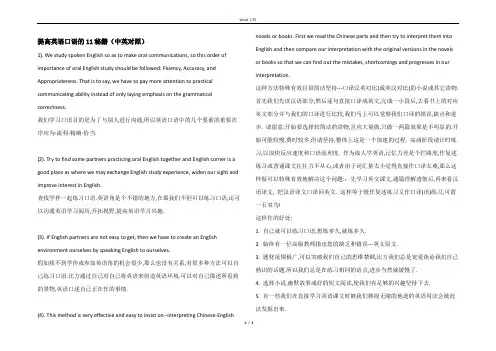
提高英语口语的11秘籍(中英对照)1). We study spoken English so as to make oral communications, so this order of importance of oral English study should be followed: Fluency, Accuracy, and Appropriateness. That is to say, we have to pay more attention to practical communicating ability instead of only laying emphasis on the grammatical correctness.我们学习口语目的是为了与别人进行沟通,所以英语口语中的几个要素的重要次序应为:流利-精确-恰当.(2). Try to find some partners practicing oral English together and English corner is a good place as where we may exchange English study experience, widen our sight and improve interest in English.查找学伴一起练习口语.英语角是个不错的地方,在那我们不但可以练习口语,还可以沟通英语学习阅历,开拓视野,提高英语学习兴趣.(3). If English partners are not easy to get, then we have to create an English environment ourselves by speaking English to ourselves.假如找不到学伴或参加英语角的机会很少,那么也没有关系,有很多种方法可以自己练习口语.比方通过自己对自己将英语来创造英语环境.可以对自己描述所看到的景物,英语口述自己正在作的事情.(4). This method is very effective and easy to insist on--interpreting Chinese-English novels or books. First we read the Chinese parts and then try to interpret them into English and then compare our interpretation with the original versions in the novels or books so that we can find out the mistakes, shortcomings and progresses in our interpretation.这种方法特殊有效且很简洁坚持---口译汉英对比(或英汉对比)的小说或其它读物.首先我们先读汉语部分,然后逐句直接口译成英文,完成一小段后,去看书上的对应英文部分并与我们的口译进行比较,我们马上可以觉察我们口译的错误,缺点和进步. 请留意:开始要选择较简洁的读物,且应大量做,只做一两篇效果是不明显的.开始可能较慢,费时较多,但请坚持,整体上这是一个加速的过程. 高级阶段请计时练习,以加快反应速度和口语流利度. 作为成人学英语,记忆力差是个拦路虎,作复述练习或背诵课文往往力不从心,或者由于词汇量太小觉得直接作口译太难,那么这样做可以特殊有效地解决这个问题::先学习英文课文,通篇理解透彻后,再来看汉语译文, 把汉语译文口译回英文. 这样等于既作复述练习又作口译(语)练习,可谓一石双鸟!这样作的好处:1. 自己就可以练习口语,想练多久,就练多久.2. 始终有一位高级教师指出您的缺乏和错误---英文原文.3. 题材范围极广,可以突破我们自己的思维禁锢,比方我们总是宠爱谈论我们自己熟识的话题,所以我们总是在练习相同的语言,进步当然就缓慢了.4. 选择小说,幽默故事或好的短文阅读,使我们有足够的兴趣坚持下去.5. 有一些我们在直接学习英语课文时被我们熟视无睹的地道的英语用法会被此法发掘出来.6. 对所学学问和所犯错误印象深刻.这等于我们始终在作汉译英练习,很多英文译文是我们费尽心思憋出来的,所以印象相当深刻.比直接学习英文课文印象要深的多.7. 经过大量的练习,你会有这样的感觉:没有什么东西你不能翻译,你的翻译水平大大加强了,你的口语表达力大大提高了!(5). Interpreting what you hear---Changing Roles: Three people make a group: one speaks Chinese, one speaks English acting as the foreigner, one acts as interpreter. Then change roles. This is a good interpreting training method and is good for studying from one another. In addition, it may improve the responding ability and speed of students. The advanced stage of this method is simultaneous interpretation.听译法-角色互换:三人一组,模拟翻译实战.一人讲汉语,一人讲英语,扮演老外,一人作翻译.练习一段时间后互换角色.这是一种特殊好的翻译训练方法,也是很好的相互学习,取长补短的方法.而且可大大提高反应速度和能力.此法的高级阶段为同声传译,我们可以在听广播或看电视或开会时,把所听内容口译英文.(6). Oral composition and 3-minute training method: This method is suitable for intense training. Making an oral composition about a certain topic for one minute the first time and record the composition on tape at the same time. Then listen to the composition and find out the room for improvement. Then make the same composition for two minutes for the second time and also record it. And at last repeat the above-mentioned for three minutes.口语作文和3分钟训练法:此法适用于强化训练.找好一个题目作一分钟的口语作文,同时将其录音.听录音,找出缺乏和错误,就此题目再作两分钟的的口语作文,同样录音,再听并找出缺乏与进步,继续作三分钟口语作文.这是高级口语训练,效果不俗.(7). Retelling exercise: Retell some articles or English stories in our own words.复述练习:最简洁也是最有效的口语学习方法.从治本上攻克英文的方法,特别适合初学者和中级学者,用自己的话背颂所听的英语故事或文章短文,应当大量地练习.(8). If possible, we may read some English tongue twisters loudly and quickly with one or two cakes of candy in our mouth (just as the Chinese cross-talk actors do.) to train our oral cavity muscle and tongues suitable for English pronunciation.假如可能我们也可以大声且快速朗读英文绕口令(就象相声演员练嘴),还可以同时口中含块糖以加大强化训练的力度.这样来强我们的口腔肌肉快速适应英文发音,使我们的口语相当流利,清晰,而且还有自信.例如:☆A big black bug bit the back of a big black bear. The big black bear bit back the big black bug.☆This fish has a thin fin; That fish has a fat fin; This fish is a fish that has a thinner fin than that fish.(9). Paying more attention to phrases and small words as one major shortcoming of Chinese English (especially Chinese oral English) is that Chinese students tend to use big words in their oral language, but the idiomatic oral English is abundant with short, active and vivid phrases. And most of such phrases are made of small words.特别留意短语(词组)和小词的运用,中国式的英语尤其是口语一个很大的缺点就是中国学生宠爱用大词,而真正地道的英语口语确是充满着短小,活泼,生动的短语,富有生气.而这些短语大部分有小词构成.(10) Thinking in English.英语思维的培育。
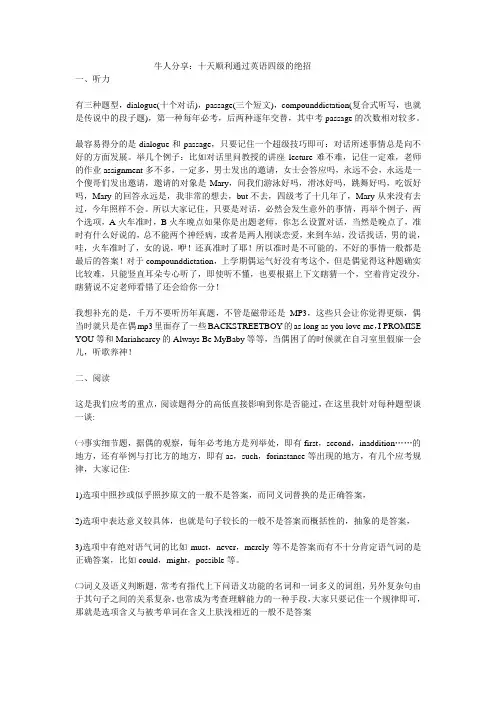
牛人分享:十天顺利通过英语四级的绝招一、听力有三种题型,dialogue(十个对话),passage(三个短文),compounddictation(复合式听写,也就是传说中的段子题),第一种每年必考,后两种逐年交替,其中考passage的次数相对较多。
最容易得分的是dialogue和passage,只要记住一个超级技巧即可:对话所述事情总是向不好的方面发展。
举几个例子:比如对话里问教授的讲座lecture难不难,记住一定难,老师的作业assignment多不多,一定多,男士发出的邀请,女士会答应吗,永远不会,永远是一个傻哥们发出邀请,邀请的对象是Mary,问我们游泳好吗,滑冰好吗,跳舞好吗,吃饭好吗,Mary的回答永远是,我非常的想去,but不去,四级考了十几年了,Mary从来没有去过,今年照样不会。
所以大家记住,只要是对话,必然会发生意外的事情,再举个例子,两个选项,A火车准时,B火车晚点如果你是出题老师,你怎么设置对话,当然是晚点了,准时有什么好说的,总不能两个神经病,或者是两人刚谈恋爱,来到车站,没话找话,男的说,哇,火车准时了,女的说,咿!还真准时了耶!所以准时是不可能的,不好的事情一般都是最后的答案!对于compounddictation,上学期偶运气好没有考这个,但是偶觉得这种题确实比较难,只能竖直耳朵专心听了,即使听不懂,也要根据上下文瞎猜一个,空着肯定没分,瞎猜说不定老师看错了还会给你一分!我想补充的是,千万不要听历年真题,不管是磁带还是MP3,这些只会让你觉得更烦,偶当时就只是在偶mp3里面存了一些BACKSTREETBOY的as long as you love me,I PROMISE YOU等和Mariahcarey的Always Be MyBaby等等,当偶困了的时候就在自习室里假寐一会儿,听歌养神!二、阅读这是我们应考的重点,阅读题得分的高低直接影响到你是否能过,在这里我针对每种题型谈一谈:㈠事实细节题,据偶的观察,每年必考地方是列举处,即有first,sceond,inaddition……的地方,还有举例与打比方的地方,即有as,such,forinstance等出现的地方,有几个应考规律,大家记住:1)选项中照抄或似乎照抄原文的一般不是答案,而同义词替换的是正确答案,2)选项中表达意义较具体,也就是句子较长的一般不是答案而概括性的,抽象的是答案,3)选项中有绝对语气词的比如must,never,merely等不是答案而有不十分肯定语气词的是正确答案,比如could,might,possible等。
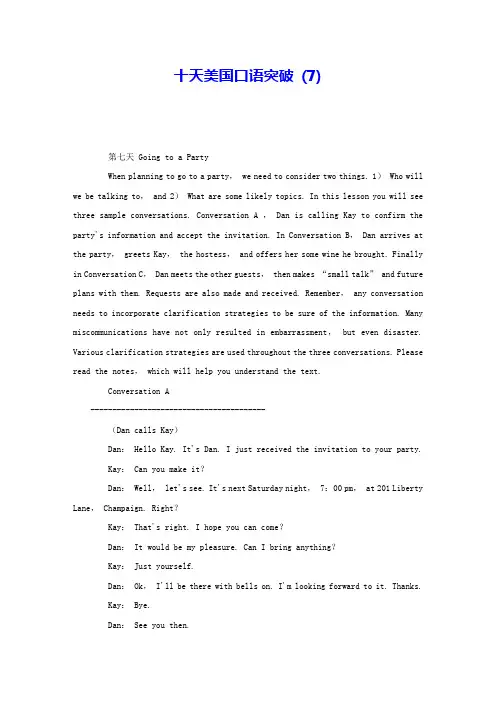
十天美国口语突破(7)第七天 Going to a PartyWhen planning to go to a party, we need to consider two things. 1) Who will we be talking to, and 2) What are some likely topics. In this lesson you will see three sample conversations. Conversation A , Dan is calling Kay to confirm the party's information and accept the invitation. In Conversation B, Dan arrives at the party, greets Kay, the hostess, and offers her some wine he brought. Finally in Conversation C, Dan meets the other guests, then makes “small talk” and future plans with them. Requests are also made and received. Remember, any conversation needs to incorporate clarification strategies to be sure of the information. Many miscommunications have not only resulted in embarrassment, but even disaster. Various clarification strategies are used throughout the three conversations. Please read the notes, which will help you understand the text.Conversation A----------------------------------------(Dan calls Kay)Dan: Hello Kay. It's Dan. I just received the invitation to your party.Kay: Can you make it?Dan: Well, let's see. It's next Saturday night, 7:00 pm, at 201 Liberty Lane, Champaign. Right?Kay: That's right. I hope you can come?Dan: It would be my pleasure. Can I bring anything?Kay: Just yourself.Dan: Ok, I'll be there with bells on. I'm looking forward to it. Thanks.Kay: Bye.Dan: See you then.Conversation B---------------------------------------------(Dan and Kay upon his arrival.)Dan: Hello.Kay: Hi, come in. Glad to see you.Dan:(inside) Thanks for inviting me. I brought some wine.Kay: Oh, how nice. Let me take it to the kitchen. Go on into the living room. I think you know most everyone.Conversation C---------------------------------------------(Dan and the other guests.)Bill: Hi! How are you?Dan: Fine. How about you?Bill: Super! Let me introduce you to my niece, Claire.Claire, this is Dan——he works with me at the office.Claire: Hello, Dan.Bill: Dan, this is my brother John's daughter, Claire.Dan: Pleased to meet you. I didn't know John had a daughter? Where's he been hiding you?Bill: She's been living out East with his wife's sister. She just moved back.Dan: What part of the East, Claire?Claire: Boston, near the harbor.Dan: It must be quite a change——coming back here?Claire: It is, but I'm glad to be back and see all my freinds.Bill: Hey, Dan. Do you still play golf?Dan: Not as much as I would like.Bill: Claire plays. Maybe we could all play sometime soon?Dan: That sounds great. How about tomorrow morning?B.&C.: Sure, say 7:00, out at Harrison Park?Dan: Great, 7 A.M. at Harrison. I'll look forward to it.Kay:(rejoining the group) I see you've met Elizabeth.Dan: Elizabeth? I thought your name was Claire?Claire: It is. My aunt just calls me by Elizabeth.Dan: Well, I've not only met Elizabeth, but the three of us are off to the greens in the morning.Kay: She'll probably whip the both of you! Ha Ha.Bill: Dan, could you pass me that newspaper? Let's see what the weather's supposed to be.Dan: Sure, here you go.Bill: Thanks.Claire: How often do you play, Dan?Dan: Well, this year I've only played twice. How about you?Claire: I was playing weekly in Boston—— with my aunt, but since I came home I haven't played once.Bill: The report is a humdinger. I guess the leftovers from hurricane Opal are gone.Dan: So are you saying it is supposed to be nice tomorrow?Bill: I sure am. It says it will be sunny and dry——perfect weather.Kay: Enough about golf. How's your dancing? Hey, Pete. Would you turn up the stereo? We've got a party going on!----------------------------------------------Notes“Let's see. It's next Saturday night at 7 at your house and the address is 201 Liberty Lane, Champaign.”This is a clarification strategy used to confirm the understood message. After saying this, Dan can be 100% sure that the message he understood is the same as the message Kay intended. If there was any misunderstanding,it could easily be cleared up at this point. Now that Dan is sure he understands the details, he can accept the invitation.“I hope you can make it?”Kay is expressing her hope that Dan can come; while at the same time, sheis asking Dan to respond whether he can or not. By asking in this way, Dan can give a number of replies——Yes, No, Maybe, We'll see, Me too, etc. Kay doesn't make Dan feel that he must give her his answer right now——perhaps pressuring him or making him uncomfortable. She is being polite.“I'll be there with bells on.”He is telling Kay that he will be there, but also he is letting her know he is excited about it and will be there on time. (“with bells on” is an American idiom which means to be excited about the event and will be there exactly on time.)“Can I bring anything?”In most informal situations it is considered a common courtesy to ask the hostess this. Often the reply will be “no, but thank you for asking” or “if you like, but it's not necessary”。
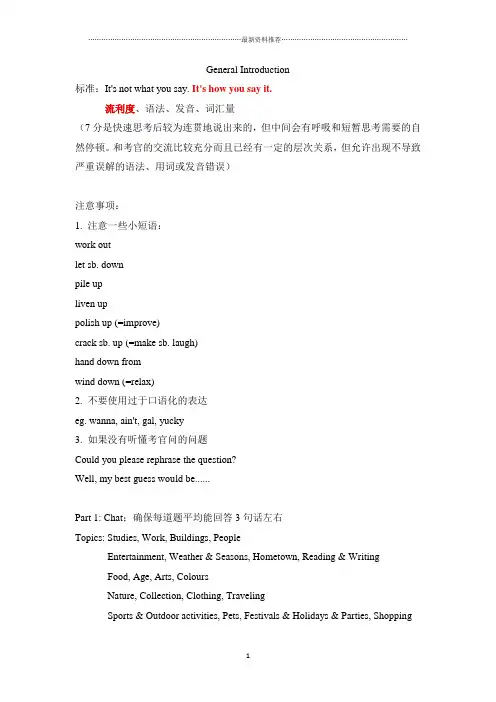
General Introduction标准:It's not what you say. It's how you say it.流利度、语法、发音、词汇量(7分是快速思考后较为连贯地说出来的,但中间会有呼吸和短暂思考需要的自然停顿。
和考官的交流比较充分而且已经有一定的层次关系,但允许出现不导致严重误解的语法、用词或发音错误)注意事项:1. 注意一些小短语:work outlet sb. downpile upliven uppolish up (=improve)crack sb. up (=make sb. laugh)hand down fromwind down (=relax)2. 不要使用过于口语化的表达eg. wanna, ain't, gal, yucky3. 如果没有听懂考官问的问题Could you please rephrase the question?Well, my best guess would be......Part 1: Chat;确保每道题平均能回答3句话左右Topics: Studies, Work, Buildings, PeopleEntertainment, Weather & Seasons, Hometown, Reading & WritingFood, Age, Arts, ColoursNature, Collection, Clothing, TravelingSports & Outdoor activities, Pets, Festivals & Holidays & Parties, Shopping问题类型:Yes/No类题Wh-/How类题Part 2: Description;会有适当的思考和停顿;需要有规划和秩序;句式会有一些变化最有价值的信息来自与你在同一个半天内考试的其他考生。
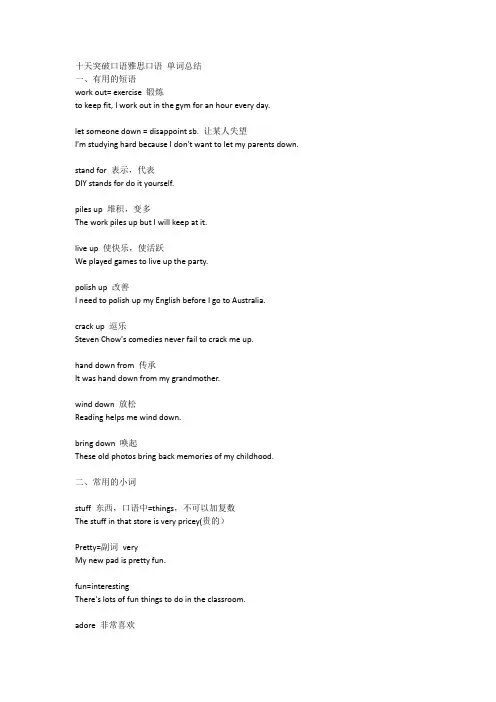
十天突破口语雅思口语单词总结一、有用的短语work out= exercise 锻炼to keep fit, I work out in the gym for an hour every day.let someone down = disappoint sb. 让某人失望I'm studying hard because I don't want to let my parents down.stand for 表示,代表DIY stands for do it yourself.piles up 堆积,变多The work piles up but I will keep at it.live up 使快乐,使活跃We played games to live up the party.polish up 改善I need to polish up my English before I go to Australia.crack up 逗乐Steven Chow's comedies never fail to crack me up.hand down from 传承It was hand down from my grandmother.wind down 放松Reading helps me wind down.bring down 唤起These old photos bring back memories of my childhood.二、常用的小词stuff 东西,口语中=things,不可以加复数The stuff in that store is very pricey(贵的)Pretty=副词veryMy new pad is pretty fun.fun=interestingThere's lots of fun things to do in the classroom.adore 非常喜欢I adore that singer.shortly= soonI'll get these things done shortly.spot 1看见=see I spotted some squirrels and woodpeckers in Stanley park.2 地方=place It looks like a nice spot for a picnic.eye-opening 是地道的英文,让人大开眼界的Trips to other countries can be really eye-opening.decent=quite good 不错的,挺好的This job offers a decent salary and an impressive set of benefits.hang out=玩儿,可以代替play,但是不能接宾语I often hang out in bars at weekend.I often hang out with them at the park.kind of=sort of 有点……,=somewhatMy boss is kind of hard to get along with.like 比如说,像是,差不多是I bought lots of stuff, like carrots ,beef and salmon.That program is like,...boring.in a row=one after another 连续地出现或发生Jeremy Lin led New York Knicks to seven wins in a row.Patricia passed four exams in a row last week.a trade-off 有得就有失There is a trade-off between the benefits of the medicine and the risk of side effects. Gracie had to make a trade-off between her job and her family.entire=whole/completeDaniel ate the entire cake and made no apology for that.Our situation is entirely different from theirs.Jessica is not entirely sure if she can get a nice job after graduation.......as well 也=.....tooBeijing is exciting for its nightlife. And it's culturally attractive as well.....is a piece of cake=...is a snap=...is a breeze 小菜一碟The IELTS speaking test is just a breeze if you know all the tricks about it.during 在...的时候We go hiking and camping during holidays.Know...inside out=know...backwards and forwards 精通He knows computers backwards and forwards.I'm all for 我完全支持某事物I've got nothing against change-I'm all for it.is no picnic=is a pain in the neck 很折磨人Getting the homework done everyday is no picnic....really bothers me./...is getting on my nerves 让我很烦The noise really bothers me./ The noise is getting on my nerves.kick back and relax=let one's hair down 放松At parties, we just kick back and relax.a couple of 几个I stayed in France for a couple of weeks.a bunch of=some 一些I went there with a bunch of new friends.dozens of 几十I just bought dozens of gifts online.loads of=piles of=tons of=a multitude of 很多= lots ofI've got loads of works to get through before tomorrow.make sense 合理= be reasonableThe plot(剧情)of that movie didn't make any sense...., you name it=and the list goes on and on 应有尽有Beijing has traditions, modern lifestyles, tasty food, exciting night-life, beautiful people...you name it.by doing that, I kill two birds with one stone 一举两得When i travel around, i take photos and then sell them online. So you see, I just kill two birds with one stone....is the best+名词,hands down. ....绝对是最....的The new IPad is the best tablet I've ever seen, hands dow....would be the last thing I want to do ....是我人生最不想做的Doing the dishes would be the last thing I want to do.that's the way the ball bounces. 命中注定就是这样了Lots of people got fired. Too bad. But that's the way the ball bounces in a recession.get the hang of 基本了解了怎样做某事"I've never used a word processor before.""Don't worry-you'll get the hang of it shortly."get...down pat 完全掌握了If you just memorize all the answers, even if you get all the answers down pat, there may still questions you haven't thought of during the test. So,....What a shame! 太可惜了They lost that match. What a shame!...is nonexistent 压根就不存在Some scientist believe global warming is non-existent. Some of them even argue that the earth is actually getting colder.end up verb+ing 常用来描述某人或某事物最终处于某种状态I ended up having to do all the work myself.suit someone well/ suit someone's needs 适合The bustling city life suits Jeremy better.。
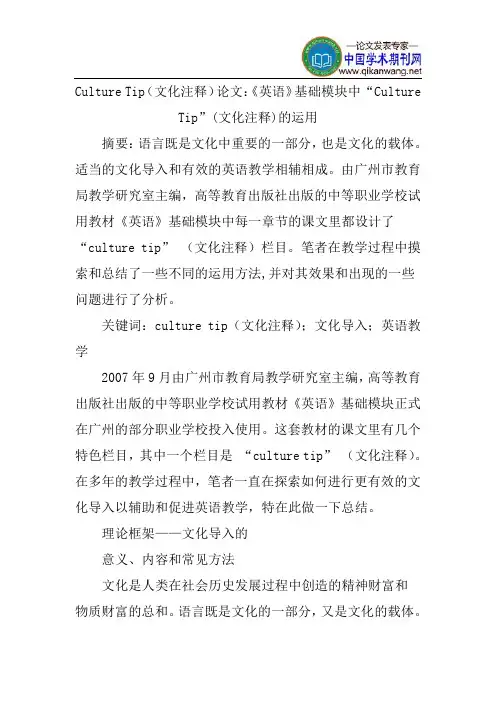
Culture Tip(文化注释)论文:《英语》基础模块中“CultureTip”(文化注释)的运用摘要:语言既是文化中重要的一部分,也是文化的载体。
适当的文化导入和有效的英语教学相辅相成。
由广州市教育局教学研究室主编,高等教育出版社出版的中等职业学校试用教材《英语》基础模块中每一章节的课文里都设计了“culture tip” (文化注释)栏目。
笔者在教学过程中摸索和总结了一些不同的运用方法,并对其效果和出现的一些问题进行了分析。
关键词:culture tip(文化注释);文化导入;英语教学2007年9月由广州市教育局教学研究室主编,高等教育出版社出版的中等职业学校试用教材《英语》基础模块正式在广州的部分职业学校投入使用。
这套教材的课文里有几个特色栏目,其中一个栏目是“culture tip” (文化注释)。
在多年的教学过程中,笔者一直在探索如何进行更有效的文化导入以辅助和促进英语教学,特在此做一下总结。
理论框架——文化导入的意义、内容和常见方法文化是人类在社会历史发展过程中创造的精神财富和物质财富的总和。
语言既是文化的一部分,又是文化的载体。
20世纪20年代,美国语言学家萨丕尔(sapir)就指出:“语言有一个环境,它不能脱离文化而存在,不能脱离社会继承下来的传统和信念”。
语言是客观世界的反映,中西方文化内涵的差异必然造成词义、句义、联想意义、比喻意义等语言现象的差异。
各个阶段的英语教学不应该仅仅包括语言知识的教学,还要包括文化知识的教学。
传授文化背景知识的目的是为了使学生更深刻地理解英语,更恰当地使用英语。
在英语实践课中进行恰当的文化导入对培养英语的基本能力具有重要的作用。
听说方面中文和英文在词义的联想意义和比喻意义上有很大差异。
例如中文里的“红茶”在英文里却是black tea (黑色的茶)。
教学者通过文化导入提供丰富的语言材料和文化背景,不但会有助于学生听力的提高,更会在了解西方文化的情况后不犯一些文化错误,真正提高口头表达的能力,达到交际的目的。
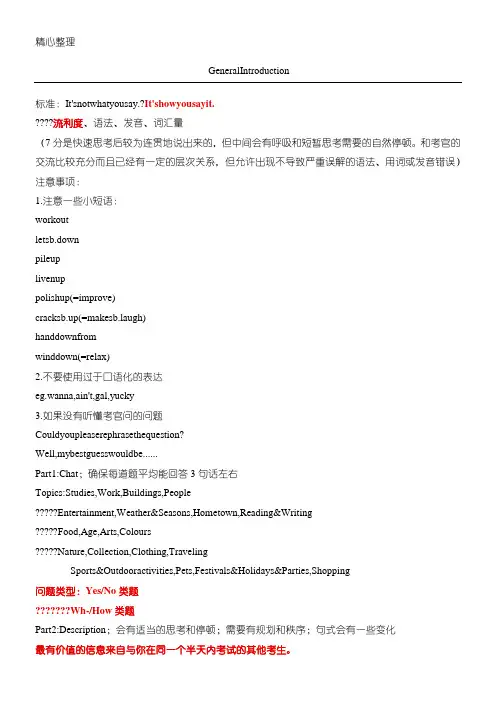
GeneralIntroduction标准:It'snotwhatyousay.?It'showyousayit.????流利度、语法、发音、词汇量(7分是快速思考后较为连贯地说出来的,但中间会有呼吸和短暂思考需要的自然停顿。
和考官的交流比较充分而且已经有一定的层次关系,但允许出现不导致严重误解的语法、用词或发音错误)注意事项:1.注意一些小短语:workoutletsb.downpileuplivenup2.3.Part1:Chat?????Entertainment,Weather&Seasons,Hometown,Reading&Writing?????Food,Age,Arts,Colours?????Nature,Collection,Clothing,TravelingSports&Outdooractivities,Pets,Festivals&Holidays&Parties,Shopping问题类型:Yes/No类题???????Wh-/How类题Part2:Description;会有适当的思考和停顿;需要有规划和秩序;句式会有一些变化Topics:Objects,Events,Places,Abstracts,PeoplePart3:Discussion;多数时候与Part2所考卡片的话题有关,但也有可能离开卡片的话题;会用到很多表示逻辑关系的连接词;比Part1和Part2更正式,但没有工作面试正式;要论述好自己的观点Topics:Buildings?????Language,Weather&Season,Cities&Countryside,Reading&Writing?????Food&Health,Media&Celebrities,Arts?????Nature,Collection,Clothing,Traveling?????Sports&Games,Animals,Festivals&Parties,Shopping??????????????Part1/3stuff(不能不错的宾语小菜一碟全支持磨人),?reallybothersme/isgettingonmynerves,?kickbackandrelax/letone'shairdown(放松),?acoupleof,abunchof(一些),dozensof,?loadsof/pilesof/tonsof/amultitudeof,?makesense(合理),younameit/andthelistgoesonandon(应有尽有),Bydoingthat,Ikilltwobirdswithonestone,?isthebest+noun,handsdown(...绝对是最...的),wouldbethelastthingIwanttodo,?That'sthewaytheballbounces(命中注定就是这样了),getthehangof(基本了解),get...downpat(完全掌握了),?Whatashame,isnonexistent,endupdoing,suit...well/suit...'sneeds 2.Slangwordsandphrases(P53-P54)elsick),pricey,beats,notuptopar(=notsatisfactory),?isadrag(=isboring),thedailygrind(=theboringthingyouha vetodoeveryday),istotallygross,?isovermyhead(=ishardtounderstand),drivemeupthewall(=drivemecrazy),h aveaball/blast(=haveagoodtime),?funky,outfit,flashy(=attention-getting),snazzy(=beautifulandexpensive), weird/odd,corny(=oldanduninteresting),?agamer/vid-kid(=aperonwholikesplayingvideogames)3.Alternativestosomeexcessively-usedwords(P55-P60)1)关于数量2)关于活动3)关于物品4)关于人567891011承担),?payoff(有回报),takeup(开始),thinkof,workout,ripsb.off(买东西被骗了),take...intoaccount,?getridof,sleepin(睡懒觉),getsoworkedup(很紧张),adaptto,participatein,copewith,getstuck,?stickto,brushupon(突击复习),burnout(累垮了),winddown(=relax),letdown,livenup?expandourknowledge/outlook/enlargeoutvision,canneverhurt/wo n'thurt(不会有坏处的),easeyourmind,releasepressure6.Super-cooladjectivesandadverbs(P65-P70)1)Adjectives3)Antonymysforpros∙100wordsinPart2(P72-P77)1.按感官分类1)视觉2)听觉3)嗅觉4)味觉5)感觉6)休闲2.1)Cities2)3)4)People5)Animals6)Objects∙注意事项:1.?2.不要换为∙1.因果so/sothat/therefore(在地道口语中用得并不算多)because/'cause/coz(不正式,不宜过度使用)2.让步eventhoughevenifalthough3.转折...,thoughbuthowever4.递进apartfrombesides5.修饰when/where6.对比in/bycontrast7.likesuchas?8.其他aswellaswellasintermsofinsteadof/ratherthan inparticularasfaras...(isconcerned/goes) 9.不是连词却胜似连词的表达tendto?get∙Essentialwordsandphrases1.WordsAsIseeit,.../Iguess.../Isuppose...Asfor.../Whenitcomesto.../Talkingabout...(英式)/Speakingof...(美式)tonsof/loadsof/pilesof/amultitudeofawealthof+积极的事物...andthelike/...andstufflikethat/...andwhatnot2.Phrasesusedtoisthenormisaluxurywon'thurtenablesb.todosth.haveahardtimedoingsth.很难去做sth.isapproaching/justaroundthecorner∙特殊的句子1.虚拟语气2.倒装句notonly/only放在句首雅思口语的段落Part1&Part31.“起—承—合”结构1)起./Thatistosay,.../...i.e..../Bytheway,...Mostimportantly,.../especially.../particularly.../inparticular3)合Allinall,.../Inanutshell(写作不宜使用)/Inshort,.../Soit'snoexaggerationtosaythat.../That'sprettymuchit./That'sallIcanthinkofnow.注意:结尾句不可说“Inaword”,它后面只能跟一个单词,而不能跟一个句子。
关于culture雅思口语话题解读culture,文化。
这是一个经久不衰的考题,下面小编就给大家分享一些关于culture雅思口语话题解读,仅供参考。
雅思口语话题cultureA foreign cultureOk, well one of the foreign cultures I’m most interested in at the moment is American culture, so that’s what I’ve decided to talk about.And as for what I know about it, well if I’m gonna be totally honest with you, I really don’t know that much, mainly because I haven’t yet been to the States, so I’m no expert in any sense of the word, but one thing I think is fair to say is that Americans really love sports, especially basketball and baseball. And I’ve also heard that, apparently, universities in America offer a lot of sports scholarships, so I think this goes to show that being good at sport is pretty highly-regarded over there, and is a strong part of their culture.So that’s one thing, and I think I’m also right in saying that rap and hip hop are very popular kinds of music in the States, because I’ve noticed that in a lot of Hollywood films I’ve watched, this type of music seems to appear quite a lot, although I have to admit that I find it really difficult to understand what exactly is being said or sung in the songs!But anyway, with regard to why I find the American culture interesting, well firstly, I guess one reason would be that it’s completely different to our culture over here, and that’s kind of what makes it so appealing to know more about. I mean, just to give you one example, the way food’s cooked in America, on the whole, is a lot different to here, as over there they tend to usean oven for most of their cooking, whereas here in China, we tend to fry most of our food. And as well as this, I think another thing that makes the American culture interesting is the fact that it encompasses so many things that I wasn’t aware of before, so learning about it has really broadened my mind.And this, I would say, is the beauty of learning other cultures, because for me at least, making an effort to understand a little bit about U.S. culture has definitely given me a wider perspective on life.So yeah, that’s pretty much all I’ve got to say, so thanks for listening.雅思口语P3话题:文化Culture考官?:What is 'culture' for you?考生?: Culture can be defined as the way of life of a particular society or section of society. It involves their customs and traditions, and so in some senses culture is what distinguishes us from others, what makes us unique. I think culture is also what connects us to our past,to our heritage. We mustn't forget modern culture either, though. Youth culture is often very vibrant and powerful, with its new and inventive forms of music, dress and art.剑桥雅思口语加分表达:be defined as 被定义为customs and traditions 习俗和传统in some senses 在一定意义上distinguish 区分connect someone to 把...和...联系起来vibrant 有活力的powerful 有力量的inventive 创新的考官?:Do you think that it is important for a society or culture to have a sense of continuity with the past?考生?: Yes, definitely. Change is necessary, but it is also frightening. For this reason, people continue to rely on their traditions to give them a sense of their roots and to remind them of where they've come from. Commemorating the past is also a way of bringing people closer together, such as during National Day.剑桥雅思口语加分表达:frightening 恐怖的continue to 继续做某事rely on 依赖a sense of their roots 一种根基感remind someone of ...让某人想起commemorate the past 纪念过去bring poeple closer together 拉近人们之间的距离解读雅思口语话题——“A Cultural Event in China”研究中心分析认为,在雅思口语考试中,关于文化、传统的话题一直以来都是考官常问的题目,而面对这样的问题,考生往往都怀有“既爱又恨”的感情。
第五天A VISIT TO THE ADVISORIn this conversation, an international student has been asked to see her advisor. The advisor has something very important to discuss with the student.------------------------------------------------------Student: You wanted to see me?Advisor: That's right. We need to have a serious talk.Student: About what?Advisor: Your attendance--or rather, lack of it.Student: OK, so I've ditched class a few times . . .Advisor: A few times? I've been told you've missed six out of eight times in two different classes! That's really setting yourself up to fail.Student: Oh, e on. Those classes are really boring!Advisor: But they're also required, so that doesn't matter. You're about to be in big trouble.Student: What's the big deal about missing some classes?Advisor: The big deal is that you're here on a student visa.Student: So?Advisor: So if you don't attend class regularly, you won't be a full-time student--which your visa requires. You'll be out of status.Student: What are you gonna do? Turn me in to the Immigration Police?Advisor: Oh, of course I'll have to report you if you continue missing your class, but I'm going to do something else first.Student: Like what?Advisor: Like faxing yourfather.-----------------------------------------------------------Notes on Vocabulary1. ditched class: intentionally missed class2. setting yourself up to fail: doing (yourself) what is necessary to cause failure3. . . . so that doesn't matter: . . . so that isn't important.4. What's the big deal about missing some classes?: What's so important about missing some classes?5. out of status: not meeting the requirements to keep your visastatus-----------------------------------------------Notes on Usage1. You wanted to see me?The student changes a statement to a question by using question (rising) intonation, not by using an auxiliary verb (did).People often use this kind of question in conversational language to suggest that they think a statement may not be true or accurate. (The student means something like "Is it true that you wanted to see me?" By using this kind of question, the student also suggests that she thinks there's no real reason for the advisor to want to see her.)2. About what?"Reduced" questions are also very mon in conversational language. The full form would be something like "What do we need to have a serious talk about?" or "About what do we need to have a serious talk?"3. Your attendance--or rather lack of it"Reduced" answers are much more mon than full answers in conversational language. The advisor means "We need to have a serious talk about your attendance--or rather, your lack of attendance."4. OK, so . . .Both OK and so are used very frequently in conversational language. Here, the student uses "OK, so . . ." to show that she admits that she's missed class a few times.5. A few times?A "reduced" answer; the advisor means something like "What do you mean by a few times?" By using "a few times," the student suggests that she hasn't missed class enough times to cause a problem. By questioning "a few times" (shown by the advisor's emphasis on "few"), the advisor is saying that there have been many absences, not just a few.6. Oh, e on.This expression is used to show that what has just been said is unreasonable or illogical. The student doesn't understand why missing some boring classes is setting herself up to fail.7. So?This one-word question is used when one doesn't understand the relationship or consequence that follows from what has just been said. (The student means she doesn't understand the relationship between missing classes and her student visa.)8. gonnaThere are many "relaxed" pronunciations of monly used phrases (for example, "hasta" or "hafta" for has to or have to, "wanna" for want to, "woulda/coulda/shoulda/mighta" forwould've/could've/should've/might've). These forms are very mon in spoken English, but they're not acceptable in most written work.9. Turn me in to . . . ?A "reduced" question: "Are you going toturn me in to . . . ?"第六天Shopping in AmericaINTRODUCTIONConversation A is a typical conversation about shopping in the United States. Masahiro is an international student who has just arrived from Japan, and Anna and Will are introducing him to the shopping scenario in America.Conversation AAnna: As I was telling you, Masa, where you shop depends largely on what you need. So, if you want to buy an answering machine or a CD-player, your best bet would probably be an appliance store such as Radio Shack..Will: Yup! Or Circuit City. I like Best Buy the best,though.Masahiro: Why?Will: Coz they usually have the best deals. They have sales on their TVs and CD-players every once in a while.Anna: Hum. I'll bet they send you their glossy ads loaded withso-called "SALES"!Masahiro: (laughs)Anna: Well, I still think the CD-player I bought from them was a rip off.Will: I'll admit some of their items are high-priced, but at least the shopper's guaranteed quality. There are very few places that have such a wide selection.Masahiro: I need to buy disks, at least two disk holders, note cards, transparencies, and that kind of stuff.Will: For office supplies, I suggest Office Max.Anna: Or p USA. One good thing about living in a campus town, though, is that you can easily get that stuff at any of the bookstores. No doubt they do overcharge. I try to get around that by shopping around.Masahiro: Shopping around?Anna: Yes. That simply means you go to different stores, check out the prices of items you need and purchase them from the store(s) withthe lowest price or prices.Masahiro: I see. Sounds very practical.Will: And time-consuming,too!Masahiro: Where is Office Max located?Anna: There's one in the mall, so we can stop by there this afternoon.Masahiro: Great! Thanks.Will: Hey, Masa. Just so you know, you can always run to the discount stores whenever you're out of something you need right away. There are several around campus.Anna: That's right. And they carry pretty much everything a student needs. Pop, pasta, eggs, hair spray . . . you name it!Will: They don't usually carry milk, though, so you might want to walk down to White Hen (Pantry), Walgreens, or some other convenience stores close by.Anna: I wouldn't advise you to buy things in bulk from such stores, though. I mean, do your major shopping at the specialized stores. It's much cheaper, and more convenient in the long run.Masahiro: Good advice!Will: Sort of like Mom's!Anna: Hey, watch it!Will: Just kiddin'!Masahiro (laughs). Life sounds great in this town! Oh! Before I forget, guys, where can I rent movies? I love watching movies in my spare time.Anna: Me too! Let's see. There are two video stores close to your apartment. Lucky you! One's Blockbuster, and the other's That's Rentertainment. I believe they both have specials on weekdays, right Will?Will: Yup. But not for the new releases. It's usually a buck each for the older movies.Anna: Are you guys ready to go to the mall?Masahiro & Will: Sure.Anna: Masa, don't forget to take your shopping list with you.Masahiro: Thanks for reminding me.Anna: You're wele. What are we waiting for? let's go.------------------------------------------------New Words and Expression1 Your best bet is a monly used idiom which refers to the best possible choice or option available. In Conversation A, it refers to the most suitable store for appliances, in Anna's opinion.2 The best deals is a frequently used shopping-related expression that refers to items for sale at bargain prices (i.e., cheap). Sometimes, "good deals" or "a real steal/What a steal" are used instead.3 Glossy adsare colorful advertisement pamphlets or catalogs (on rich/glossy paper) that entice shoppers and usually encourage them to be "smart shoppers" or people who look for "good deals" or "sales."4 A rip off is another frequently employed shopping-related expression used by shoppers who feel that they have been cheated. It is generally the case that the item purchased was overpriced (i.e., too costly) when it was bought.5 Items that are high-priced are very expensive.6 A wide selection refers to a wide array of items (e.g., models of VCRs, TVs, microwaves, walkmans, etc., depending on the store in question).7 Stuff is a "safe" word that can be used to refer to anything the speaker intends it to refer to. Often, it is used when a speaker cannot recall the names of things s/he wants to refer to, and when s/he wishes to avoid having to mention what may appear to be an endless list.8 Stores are known to carry items. In other words, they have the items they "carry." However, stores could be "out" of certain items (when their supplies have been exhausted).9 Convenience stores, as the name suggests, are stores that carry basic necessities such as bread, milk, eggs, soft drinks, tooth paste, newspapers, magazines, and so on. They are usually conveniently located (in small towns, suburbs, and big cities) which also accounts for the name.10 In bulk is a shopping-related idiom that is used to refer to items purchased in large quantities. Such supplies are cheaper and last longer. Generally, families shop in bulk for items such as sugar, rice, candy, canned products, etc. However, perishable products (such as vegetables) are rarely purchased in bulk. Instead, they are usually purchased on a daily or weekly basis. Specialized stores are stores that sell particular things. In other words, they specialize in the sale of particular products (e.g., grocery stores sell groceries, hardware stores sell hardware products such as nuts and bolts, paint, nails, hammers, etc.)11 Specials refer to discount deals/prices. In Conversation A, they refer to discount video rental rates.12 A buck each refers to a dollar per item in question (video tapes in Conversation A)13 A shopping list is a handy list of itemsa shopper intends to buy. Most Americans draw up shopping lists before they go shopping. Such a list makes shopping easier, as the shopper consults it while shopping, and that way, does not forgetto buy what s/he needs.---------------------------------------------ExercisesExercise A: Practicing Useful Shopping-Related Expressions----------------------------------------------------Instructions: Carefully read the followingExercise B: What Kind of Store?---------------------------------------------------------Instructions:Read each mini-dialog and specifyAnna: Thanks.第六天Shopping in AmericaConversation Cplaining about Some Purchases[Three weeks after Anna, Will, and Masahiro went to the mall]Anna: Hi Masahiro! How's it going?Masahiro: Fine, I guess. How about you?Anna: Busy. Guess who's ing our way?Will: Hi guys! What's up?Anna: Nothing much. We just ran into each other.Will: That's nice. So Masahiro, how's the coffee maker working?Masahiro: Actually, it doesn't work well. It was a waste of money. I guess I should have shopped around for a good one.Anna: Why don't you take it back?Masahiro: I'd like to, but I've misplaced the receipt.Will: Well, if it's any consolation, my shopping wasn't all that great either. I wish I'd never bought Stephanie a necklace. Just last night she was telling me how she wished she had Liz Taylor's new perfume.Anna: That makes three displeased shoppers. Guess what? The camera I bought and shipped to Mike just this morning is now on sale! It's a pity that I bought it then. Then again, I guess I shouldn't plain. It was a good buy, even though I didn't get the best deal on it. Anyway, Masahiro, I suggest you look for that receipt and just go to the plaints Department and say "I'd like to exchange this, please." It's as simple as that. And Will, it's not too late for you to ask for a refund.------------------------------------------New Words and Expressions 1. I regret buying. . . is a very frequently employed shopping-related expression used to refer to purchases a shopper is not happy with.2. Why don't you take it back? is a monly asked question that usually serves as a suggestive response to a shopper's plaint about a purchase. By asking this question, the speaker urges the hearer to return the item s/he is clearly not satisfied with.3. I wish I'd never bought . . . is another monly used expression of plaint.4. A good buy is used to refer to apurchase that the shopper is very pleased with--usually a great/discount deal.5. The best deal refers to the cheapest and most satisfying purchase price.6. The plaints Department, as the name suggests, is the section of the store that takes Customer plaints and grants requests for refunds, requests to exchange items, and so on.7. A refund simply refers to the money paid for an itemreturned to a store. This money is given back to the shopper.。
关于中国传统文化英语口语考试范文全文共10篇示例,供读者参考篇1Hello everyone! Today I want to talk about Chinese traditional culture. Chinese culture is super cool and interesting!Firstly, let's talk about Chinese calligraphy. Do you guys know what calligraphy is? It’s like writing, but making it look really beautiful. Chinese calligraphy has been around for a loooong time. People use special brushes and ink to write characters. It looks so fancy and artistic!Next, let’s talk about Chinese food. Yum yum! Chinese food is so tasty! There are so many different kinds of Chinese cuisine, like Sichuan, Cantonese, and Beijing. I love eating dumplings and noodles. And don’t forget a bout the yummy mooncakes during the Mid-Autumn Festival!Now let’s talk about Chinese festivals. Chinese people love celebrating festivals! We have the Spring Festival, Mid-Autumn Festival, Dragon Boat Festival, and many more. Each festival has its own special customs and traditions. We get to eat yummy food and play fun games during these times.Last but not least, let’s talk about Chinese opera. Chinese opera is so cool! The performers wear colorful costumes and make-up. They sing, dance, and act out stories on stage. It’s so different from Western opera, but just as awesome.In conclusion, Chinese traditional culture is really awesome and full of fun things to learn about. I hope you guys can learn more about it and appreciate how special it is. Chinese culture rocks! Bye bye!篇2Chinese traditional culture is really cool and awesome! There are so many fun and interesting things to learn about, like the different festivals, rituals, and customs.One of the most famous Chinese festivals is the Spring Festival, also known as Chinese New Year. It's a time when families come together to celebrate and there's tons of delicious food to eat, like dumplings and fish. We also get to watch lion and dragon dances, and set off fireworks to scare away bad luck. It's so much fun!Another cool part of Chinese culture is the traditional Chinese medicine. Did you know that some Chinese medicines are made from plants and herbs? It's really amazing how thesenatural ingredients can help people feel better. And don't forget about tai chi and qigong, two traditional exercises that are great for staying healthy and relaxed.One of my favorite things in Chinese culture is the beautiful traditional clothes, like the qipao and hanfu. They are so colorful and elegant, and make you feel like a prince or princess from ancient times. I love wearing them during special occasions!I also enjoy learning about the different Chinese traditions and customs, like respecting our elders, showing kindness to others, and celebrating the mid-autumn festival with mooncakes. It's important to remember and pass on these traditions to the next generation.In conclusion, Chinese traditional culture is a treasure trove of fun and interesting things to learn about. It's important to appreciate and preserve our culture for future generations to enjoy. Let's continue to celebrate and learn about our rich heritage!篇3Title: Chinese Traditional CultureHi everyone! Today I'm going to talk about Chinese traditional culture. Chinese traditional culture is super cool and fun to learn about. There are so many interesting things to know. Let's get started!First of all, let's talk about Chinese calligraphy. It's like painting with words! Chinese calligraphy is an important part of Chinese culture and it looks so beautiful. The characters are like artwork and each stroke is carefully done. People in China have been using calligraphy for thousands of years to write poems, letters, and even books.Next, let's talk about Chinese martial arts. Have you heard of kung fu? It's a type of martial arts that originated in China. Kung fu masters can do amazing things like break bricks with their hands and kick really high. It takes a lot of practice and discipline to learn kung fu, but it's so cool to watch!Another cool thing about Chinese culture is traditional festivals. Have you ever heard of Chinese New Year? It's the biggest celebration in China and it's so much fun. People wear red clothes, eat dumplings, and watch dragon dances. There are also other festivals like Mid-Autumn Festival and Dragon Boat Festival which are all super fun to celebrate.And of course, we can't talk about Chinese culture without mentioning the delicious Chinese food. Have you tried dumplings, noodles, or fried rice? Chinese cuisine is so tasty and there are so many different dishes to try. It's a big part of Chinese culture and people in China love to eat together with their families.In conclusion, Chinese traditional culture is so interesting and fun to learn about. From calligraphy to martial arts to delicious food, there's so much to explore. I hope you all enjoyed learning about Chinese culture with me. Let's keep celebrating and sharing the beauty of Chinese traditions together! Bye bye!篇4Title: Chinese Traditional CultureHey guys, have you ever heard about Chinese traditional culture? It's super cool and interesting! Let me tell you all about it!First, let's talk about Chinese calligraphy. It's like writing but with really fancy strokes. Chinese people have been doing calligraphy for over 3000 years! It's so artistic and beautiful, like drawing with words.Next up is Chinese painting. It's not just about painting pretty pictures, it's about telling a story. Chinese painters use special brushes and ink to create amazing landscapes and scenes that have deep meanings. It's like reading a book with your eyes!Now, let's talk about Chinese festivals. There's so many cool festivals in China, like the Spring Festival, Mid-Autumn Festival, and Dragon Boat Festival. People celebrate with yummy food, colorful decorations, and fun activities. It's like having a party all the time!And don't forget about Chinese martial arts! It's like watching a superhero movie, but in real life. People practice martial arts to stay healthy, learn self-defense, and show off some super cool moves. It's so awesome!Chinese traditional culture is so rich and diverse. It's like a treasure chest full of amazing things. So, let's all learn more about it and appreciate the beauty and wisdom of Chinese traditions! Go China!篇5Today I want to talk about traditional Chinese culture. It's really cool and interesting, so let's learn more about it!First of all, Chinese traditional culture is super old, like really, really old. It dates back thousands of years and has been passed down from generation to generation. There are so many cool things in Chinese culture, like calligraphy, martial arts, and of course, delicious Chinese food.One of the most famous things in Chinese culture is Chinese calligraphy. It's like writing, but it's like a super fancy way of writing. The characters are really pretty and can be a form of art. People practice calligraphy for years to get really good at it.Another cool thing is martial arts. In China, there are different styles of martial arts, like Kung Fu and Tai Chi. People practice martial arts to stay healthy and strong, but also to learn discipline and respect.And let's not forget about Chinese food! Chinese food is so tasty and there are so many different dishes to try. From dumplings to noodles to Peking duck, there's something for everyone to enjoy.Overall, Chinese traditional culture is really awesome and has so much to offer. It's important for us to learn about different cultures and appreciate the beauty and history behind them. So next time you see something related to Chinese culture, take amoment to learn more about it and immerse yourself in the rich tradition that China has to offer.篇6Title: Chinese Traditional CultureHi everyone, today we are going to talk about Chinese traditional culture. Chinese traditional culture is really cool and interesting! There are so many things to learn about it.First, let’s talk about Chinese calligraphy. Chinese calligraphy is like art, but with words! People use brushes and ink to write beautiful characters on paper. It takes a lot of practice to write well, but it looks so awesome when you do it right. I want to learn how to do calligraphy!Next, let’s talk about Chinese festivals. There are so many fun festivals in China, like Chinese New Year and theMid-Autumn Festival. During Chinese New Year, we get to eat yummy food and watch dragon dances. And during theMid-Autumn Festival, we get to eat mooncakes and look at the full moon. It’s so much fun!We can’t forget about Chinese martial arts! Have you ever seen kung fu movies? They are so cool! Kung fu is a type ofmartial art that comes from China. People practice kung fu to stay healthy and strong. It takes a lot of hard work to be good at kung fu, but it’s worth it.Lastly, let’s talk about Chinese traditional clothing. Have you seen a cheongsam before? It’s a beautiful dress that Chinese women wear. It looks so elegant and pretty. I wish I could wear a cheongsam too!Chinese traditional culture is so amazing, right? There are so many things to learn and explore. I hope you all get the chance to learn more about Chinese traditional culture. It’s really cool!篇7Title: My Thoughts on Traditional Chinese CultureHey everyone, today I want to talk to you about traditional Chinese culture. It's really interesting and cool, so let's dive into it!First of all, Chinese traditional culture has a long history, like, super long. It has been around for thousands of years and has influenced so many other cultures around the world. From ancient philosophy and literature to art and music, there's just so much to explore and learn about.One of the coolest things about Chinese culture is the food. I mean, who doesn't love Chinese food, right? From dumplings and noodles to Peking duck and hot pot, there's something for everyone to enjoy. And let's not forget about all the different kinds of tea – green tea, black tea, oolong tea, the list goes on and on. Yum!Oh, and have you heard about traditional Chinese medicine? It's all about using natural ingredients like herbs and plants to heal the body and keep it balanced. It's a whole different way of thinking about health and wellness, and it's been practiced for centuries.But it's not just about the food and medicine – Chinese culture is also full of cool traditions and customs. Like the Lunar New Year, dragon dances, and the beautiful traditional clothing like qipaos and hanfu. It's just so colorful and lively!I think it's important for us to learn about and appreciate traditional Chinese culture because it helps us understand where we come from and who we are. It's like a window into the past that can teach us so much about ourselves and the world around us.So let's all take some time to explore and celebrate traditional Chinese culture – it's pretty amazing! Thanks for listening, guys. See you next time!篇8Once upon a time, in ancient China, there were many cool traditions and stories that have been passed down through generations. These traditions are what we call Chinese traditional culture. Let me tell you all about it!First of all, let's talk about Chinese New Year, or Spring Festival. It's like the biggest party of the year! There are fireworks, delicious food, dragon dances, and red envelopes filled with money. We wear new clothes and visit our relatives to wish them good luck in the new year. It's so much fun!Next up is the Mid-Autumn Festival, also known as the Moon Festival. We eat mooncakes, which are these yummy pastries filled with sweet bean paste or lotus seed paste. We also admire the beautiful full moon at night and tell stories about Chang'e, the moon goddess.Another important tradition is Chinese calligraphy. We use special brushes and ink to write beautiful characters on paper.It's like painting with words! Calligraphy is a way for us to express our thoughts and emotions in a creative way.Oh, and don't forget about martial arts! Kung Fu is a popular traditional Chinese martial art that has been practiced for centuries. It's all about strength, discipline, and self-defense. Some famous Kung Fu masters even have super cool moves and powers!There are so many more traditions and stories to learn about Chinese traditional culture. It's like a treasure trove of history and wisdom. By celebrating and learning about these traditions, we can better understand and appreciate our rich heritage.So, next time you see a dragon dance or taste a mooncake, remember that you are taking part in the magic of Chinese traditional culture. Let's keep these traditions alive and pass them on to future generations!篇9Title: Chinese Traditional CultureHey guys, today I wanna talk about Chinese traditional culture. Chinese culture is so cool and interesting, it's beenaround for thousands of years! Let's dive in and learn more about it!First off, let's talk about Chinese calligraphy. Did you know that Chinese writing is one of the oldest in the world? It's like drawing pictures with words! Chinese calligraphy is so beautiful, with different styles and strokes. People in ancient China used brushes and ink to write on paper or silk. It's like a form of art!Next, let's talk about Chinese New Year. It's the most important holiday in China! People celebrate with dragon dances, fireworks, and lots of yummy food. Did you know that each Chinese New Year is named after an animal of the zodiac? There's the Year of the Rat, Year of the Ox, and so on. It's so fun to learn about all the traditions and customs!Another cool thing about Chinese culture is martial arts. Have you heard of Kung Fu? It's a type of martial art that originated in China. It's all about discipline, strength, and agility. People practice Kung Fu to improve their physical and mental health. It's like being a super cool ninja!Lastly, let's talk about Chinese food. Yum, yum, yum! Chinese cuisine is one of the most delicious in the world. There's so many dishes to try, like dumplings, Peking duck, and hot pot. Chinese people believe in the balance of flavors and ingredients in theirfood. That's why every bite is like a burst of flavors in your mouth!So guys, Chinese traditional culture is so fascinating and unique. It's like a treasure trove of history, art, and traditions. Let's keep exploring and learning about it, and maybe one day we can all be experts in Chinese culture! Thanks for listening, and see you next time!篇10Traditional Chinese culture is super cool, guys! There are so many awesome things about it that we can learn and be proud of. Let me tell you all about it in this super fun English exam essay!First off, let's talk about the Chinese New Year. It's like the biggest, most fun party ever! People wear cool red clothes, eat yummy dumplings and watch amazing dragon dances. Plus, we get red envelopes with money inside, how cool is that?!Next up, let's talk about Confucius. He was a wise dude who said a lot of smart things about being kind, respectful and honest. We can all learn a lot from him, like how to be good friends and get along with others.Oh, and don't forget about Chinese calligraphy. It's like writing, but way more fancy and artistic. You use special brushes and ink to write beautiful characters that look like little artworks. It's so cool to see how creative and skilled people can be with just a pen and paper.And let's not forget about traditional Chinese medicine. It's all about using natural herbs and acupuncture to help people feel better. It's like magic how these ancient remedies can make us healthy and strong.In conclusion, Chinese traditional culture is totally awesome and we should all be proud of it. Let's celebrate our heritage and keep these cool traditions alive for generations to come. Thank you for listening to my super fun essay!。
十天美国口语突破(1第一天 Making FriendsWhen making new friends, there are usually three parts to the conversation you will have with your new friend. The first is the greeting. In this part, you and your new friend will greet each other and tell each other your names. The second part is the conversation. Sometimes the conversation is small talk and some times the conversation is about important matters, such as business. “Small talk” is an American slang term. It means that the conversation is about matters that are not very important. When conversing with your new friend, it is customary to give information about your family, your work, or you will talk about any matter that is important to you and your new friend. The third part of the conversation is the leave-taking. In this part, you tell your new friend that you are happy to meet him and that you must end the conversation.In this conversation, Thinh will introduce himself and his wife to Jim,their new neighbor.--------------------------------------------------------------Thinh: Hello.Jim: Oh, hi there!Thinh: Please allow me to introduce myself. My name is Thinh Nguyen and this is my wife, Lan Quong.Jim: Pleased to meet you. My name is Jim Peters. Did you just move in next door?Lan: Yes, we did. Have you lived here long?Jim: Me? I guess so. I've lived here for about 6 years now. Have you lived in America very long?Thinh: No. Not really. When we left Vietnam and came to America we lived with a cousin in Dallas for 2 years. Where do you work, Jim?Jim: I teach mathematics at Willow Springs community college. What do you do?Thinh: I am a mechanic at Allied Diesel. I repair truck engines.Jim: What about you, Lan?Lan: I am a nurse's assistant at Whitfield County hospital.Jim: Well, Thinh and Lan, it was good to meet you. I have to go now. I'm teaching a class this evening and I need to get to the college.Thinh: It was good to meet you, too, Jim.Lan: Yes, it was good to meet you.Jim: See you around!Thinh and Lan: Good-bye, Jim!------------------------------------------------------------------ New words and Expressions“Allow me to introduce myself.“ - This phrase is used when you want to tell your new friend that you are going to tell him your name.“Pleased to meet you.”- This phrase is used after you and your new friend have told each other your names.“Did you just move in next door?”,“Where do you work?”,“Have you lived here long?”- These are some phrases that people use to make “small talk.” These phrases are used when you ask your friend for basic information about himself. These phrases help new friends to get to know about each other's lives.“It was good to meet you.”- This phrase is usually used when you are ending the conversation. A person who uses this phrase will be considered polite by his new friend.。
tips翻译基本解释●tips:小费,提示,技巧●音标:/tɪps/●词性1 (n):小费,提示,技巧具体用法●●名词(n):oo意思1:小费ooo同义词:gratuity, bonus, reward, gift, donationooo反义词:penalty, fine, charge, fee, deductionooo例句:●The waiter was very attentive, so we decided to leave agenerous tip for his excellent service. (服务员非常细心,所以我们决定为他的优质服务留下丰厚的小费。
)●In some countries, it is customary to give a tip to taxi driversfor their service. (在一些国家,给出租车司机小费是习惯。
)●She always leaves a tip for the housekeeping staff when shestays at a hotel. (她住酒店时总是给客房服务人员留下小费。
)●The restaurant automatically adds a tip to the bill for partiesof six or more. (餐厅会自动在六人或以上的聚会账单中加上小费。
)●He was surprised to find that the tip was already included inthe total amount. (他惊讶地发现小费已经包含在总金额中。
)●Many people believe that leaving a tip is a way to showappreciation for good service. (许多人认为留下小费是表达对优质服务的感谢的一种方式。
Culture tips:
It is very common to see a lady get picked up by a guy in a bar. For men , there are many different ways to approach a lady, but once you have made the first move and her response is not positive, you should stop any further advances(套交情), The polite thing to do is to recognize this and leave. Western males tend to be a lot less shy about approaching a lady and trying to get a date than Asians are.There is no harm in talking, but if a man get too pushy, the lady will usually not be shy either and will tell him to take hike. In Beijing, Sanlitun has a well-known reputation for its wild night life. There are different kinds of bars to suit(迎合)each individual’s need. Since 2008, there was a very famous club in Guomao called Xiu which accommodated(迎合)most of the upper class playboys, playgirls and famous celebrities. Playboys and playgirls often give the impression of unable to get serious about any relationship. Most of them don’t hide their intentions. They want to play the field(玩), but when the right person(意中人,Mr Right,My better half)comes along, there is always the possibility of a lasting relationship forming. Nowadays(现在这个社会), casual(休闲,Formal SEMICASUAL)dating happening all the time is an understatement,as most dating before marriage is becoming more and more casual. Going on a date(去约会)doesn’t mean that people are at all exclusive. In fact, some people often date more than one person at the same time; however, when the relationships become more serious, they become exclusive.。